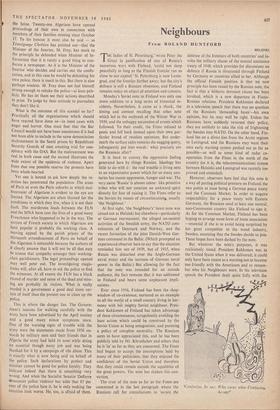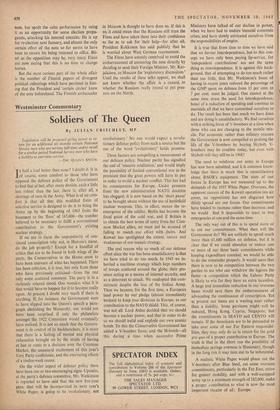Neighbours
From ROLAND HUNTFORD
HELSINKI
`rT-41-1E ladies of St. Petersburg,' wrote Peter the Great in justification of one of Russia's numerous wars with Finland, `could not sleep peacefully as long as the Finnish frontier ran so close to our capital.' St. Petersburg is now Lenin- grad, and the frontier farther away; but the city's defence is still a Russian obsession, and Finland remains today an object pf attention and concern. Monday's Soviet note to Finland was only one more addition to a long series of historical in- cidents. Nevertheless, it came as a shock, the timing and content recalling that other note which led to the outbreak of the Winter War in 1939, and the unhappy succession of events which followed. To their credit, the Finns refused to panic and fell back instead upon their own par- ticular brand of resolute optimism. But under- neath the surface calm remains the nagging query, infrequently put into words : what precisely are the Russians after?
It is hard to convey the oppressive feeling generated here by things Russian. Ideology has little to do with it : the real trouble is living next to an expansionist power which for so many cen- turies has meant oppression, hunger and war. The very name `Russia' is almost taboo: like primitive tribes who will not mention an awkward, spirit directly for fear of raising it. The Finns refer to the Soviets by means of circumlocutions, usually `the Neighbour.'
At first sight, `the Neighbour's' latest note was aimed not at Helsinki but elsewhere—particularly at German rearmament, the alleged un-neutral activities of the Swedish army, the NATO com- mitments of Denmark and Norway, and the recent formation of the joint Danish-West Ger- man command in the Baltic. (Which prompted an experienced observer here to say that the situation reminded him not of 1939, but of 1935, when Russia was disturbed over the Anglo-German naval treaty and the increase of German naval power in the. Baltic.) But allowing for the fact that the note was intended for an outside audience, the fact remains that it was addressed to Finland and bears some unpleasant impli- cations.
Ever since 1956, Finland has been the shop- window of co-existence, nurtured as an example to all the world of a small country living in har- mony with her mighty Soviet neighbour. Presi- dent Kekkonen of Finland has taken advantage of these circumstances, scrupulously avoiding the least action which could be construed by the Soviet Union as being antagonistic, and pursuing a policy of complete neutrality. The Russians seem to have appreciated this, and he has been publicly told by Mr. Khrushchev and others that he is 'in' as far as they are concerned. The Finns had begun to accept the assumptions held by many of their politicians, that they enjoyed the confidence of the Soviet Union and therefore that they could remain outside the squabbles of the great powers. The note has shaken this con- viction.
The crux of the note as far as the Finns are concerned is in the last paragraph where the Russians call for consultations to 'secure the defence of the frontiers of both countries' and in- voke the military clause of the mutual assistance treaty of 1948, which provides for discussions on defence if Russia is threatened through Finland by Germany or countries allied to her. Although the official Finnish position is that no new principle has been raised by the Russian note, the fact is that a hitherto dormant clause has been invoked, which is a new departure in Finno- Russian relations. President Kekkonen declared in a television speech that there was no question of the Russians 'demanding bases'—his own opinion, but he may well be right. Unless the Russians have suddenly reversed their policy, they are unlikely to take the risk of frightening the Swedes into NATO. On the other hand, Fin- land lies on a direct line from the Arctic regions to Leningrad, and the Russians may want their own early warning system pushed out as far as possible—as well as some kind of radar co- operation from the Finns in the north of the country (as it is, the telecommunications system between Helsinki and Leningrad was recently :ling. proved and extended).
However, observers here feel that this note is a way of putting political pressure on Finland, the two points at issue being a German peace treaty and the Common Market. In order to acquire respectability for a peace treaty with Eastern Germany, the Russians need at least one neutral, non-Communist country like Finland to sign it. As for the Common Market, Finland has been hoping to arrange some form of loose association —essential if she is to avoid being outpriced by her great competitor in the wood industry, Sweden, assuming that the Swedes decide to join. These hopes have been dashed by the note.
But whatever the note's purposes, it was maliciously timed. President Kekkonen was in the United States when it was delivered; it could only have been meant as a warning not to become too friendly with, the Americans and to remem- ber who his Neighbours were. In his television speech the President dealt quite fully with the 'Confucius, he say. Who cares what Confucius, he say?' note, but spoilt the calm performance by using it as an opportunity for some election propa- ganda, attacking his internal enemies. He is up for re-election next January, and almost the only certain effect of the note so far seems to have been to ensure his being returned to office. Bit- ter as the opposition may be, very many Finns are now saying that this is no time to change horses.
But the most curious part of the whole affair is the number of Finnish papers of divergent political colourings which have persisted in hint- ing that the President and 'certain circles' knew of the note beforehand. The Finnish ambassador in Moscow is thought to have done so. If this is so, it could mean that the Russians still trust the Finns and have taken them into their confidence so far as to ask for their help—for after all, President Kekkonen has said publicly that he is worried about West German rearmament.
The Finns have astutely contrived to avoid the embarrassment of answering the note directly by deciding to send their Foreign Minister, Mr. Kar- jalainen, to Moscow for `exploratory discussions.' Until the results of these talks appear, we shall not know whether the affair is a canard, or whether the Russians really intend to put pres- sure on the North.











































 Previous page
Previous page